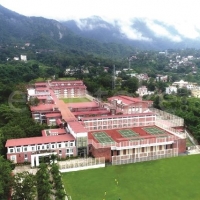Unison World School in Dehradun, Uttarakhand Admission, Fees Structure

Where is Unison World School ?
Unison World School is Located in Dehradun , Uttarakhand, India
Address of Unison World School, Dehradun
Mussoorie Diversion Road
Dehradun - 248 009 INDIA
+91 135.7113000, +91 135.3000000
+91 98370 22222
admissions@uws.edu.in
www.uws.edu.in
How do I contact Unison World School?
Call at +91 98370 22222 to contact Unison World School
About Unison World School
Founded in 2007, Unison World School is an All Girls' Residential School offering quality education to girls from Grades 5 to 12 with finest academic, co-curricular and living facilities.
Part of the Unison Education Foundation, the School remains steadfastly committed in providing high-quality teaching in a warm, inspiring and accepting environment, where girls can be themselves, develop a wide range of skills, and enjoy their formative years. While preserving the best in traditional Indian and International culture, we have opted for a student-centric, value based learning and education system with ample opportunities for individual growth and development. Our world class facilities with state-of-the-art campus, international curriculum, finest accommodation, committed and qualified faculty and experienced staff, seek to place Unison as India’s most admired, respected and renowned School.
The School is set amidst an attractive countryside, just seven km from Dehradun city center. Unison’s pupils enjoy a calm, happy and purposeful atmosphere drawing upon the beautiful location of the campus. Extensive co-curricular facilities including an indoor swimming pool and multiple playing fields and courts add to the tranquil environment at Unison.
The School is a safe and secure place for girls. Professional security personnel guard the campus round-the-clock and only female staff and security personnel have access to the boarding chalets.
The city is noted for its picturesque landscape and slightly milder climate and provides a gateway to the surrounding region It is well connected and in proximity to Himalayan tourist destinations such as Mussoorie, Dhanaulti, Chakrata, New_Tehri, Uttarkashi, Harsil, Chopta - Tungnath, Auli, India, famous summer and winter trekking destinations like Dodital, Dayara Bugyal, Kedarkantha, Har Ki Dun for camping and grandeur Himalayan panoromic views The Hindu holy cities of Haridwar and Rishikesh along with the Himalayan pilgrimage circuit of Chota Char Dham ie Yamunotri, Gangotri, Kedarnath and Badrinath.
Dehradun is also known for its Basmati rice and bakery products Dehradun is a notable academic and research hub and is home to Indian Military Academy, Rashtriya Indian Military College, Uttarakhand Ayurveda University, Forest Research Institute, Wadia Institute of Himalayan Geology, and Indira Gandhi National Forest Academy According to the combined survey based on health, infrastructure, economy, education and safety; conducted by Dainik Jagran and KPMG, Dehradun is one of the safest cities to live in The city stands at an elevation of approximately 700 metres (2,300 ft) above sea level Also known as the ‘Abode of Drona’, Dehradun has been an important centre for Garhwal rulers which was captured by the British.
Often referred as the gateway to Mussorie Uttarakhand Police is the main law enforcement agency in the city
The winter capital of Uttarakhand is Dehradun, the largest city of the state, which is a rail head Gairsain, a town in Chamoli district is the summer capital of Uttarakhand The High Court of the state is located in Nainital Archaeological evidence supports the existence of humans in the region since prehistoric times The region formed a part of the Uttarakuru Kingdom during the Vedic age of Ancient India.
Among the first major dynasties of Kumaon were the Kunindas in the 2nd century BCE who practised an early form of Shaivism Ashokan edicts at Kalsi show the early presence of Buddhism in this region During the medieval period, the region was consolidated under the Katyuri rulers of Kumaon also known as 'Kurmanchal Kingdom' After the fall of Katyuris, the region was divided into the Kumaon Kingdom and the Garhwal Kingdom In 1816, most of modern Uttarakhand was ceded to the British as part of the Treaty of Sugauli.
Although the erstwhile hill kingdoms of Garhwal and Kumaon were traditional rivals, the proximity of different neighbouring ethnic groups and the inseparable and complementary nature of their geography, economy, culture, language, and traditions created strong bonds between the two regions, which further strengthened during the Uttarakhand movement for statehood in the 1990s The natives of the state are generally called Uttarakhandi, or more specifically either Garhwali or Kumaoni by their region of origin According to the 2011 Census of India, Uttarakhand has a population of 10,086,292, making it the 20th most populous state in India